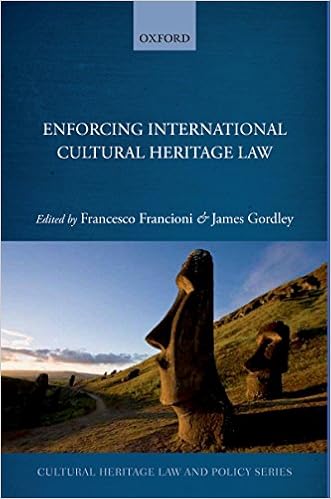
By Cary Boucock
Faith within the application and cost of criminal rights kinds the political logic of our age. With its profound breadth and perception into the trendy , Max Weber's social and political suggestion is extensively thought of to be the main influential of the period. felony phenomena play a centre-stage position in his account of the advance of the West and the rationalism of contemporary social arrangements.
Cary Boucock's .In the Grip of Freedom. examines the connection among Max Weber's .Sociology of legislation. and his interpretation of the constitution and which means of contemporary society. Weber's social and political notion is investigated within the context of advancements in Canada that have the 1982 enactment of the Canadian constitution of Rights and Freedoms-namely, the stream towards a rights-oriented kingdom the place extensive social concerns are routed in the course of the courts, and the political self-understanding of the citizen turns into more and more tied to a belief of the person as a rights-bearing topic.
Professor Boucock's textual content runs opposed to the grain of traditional exams of Weber's felony thought and its applicability to knowing modern felony advancements. He explores the importance of Weber's sociology of legislation theories in the greater compass of his sociological proposal and illustrates the importance of Weber's sociology for examining the social dimensions of present-day criminal advancements in Canada. Weber's paintings is a automobile for knowing the social and felony practices of our personal time, and therefore, is going a long way past an easy interpretation of the nice German thinker.
Read Online or Download In the Grip of Freedom: Law and Modernity in Max Weber PDF
Similar human rights books
Political Violence and the International Community: - download pdf or read online
Are civil conflicts and coups d'etat issues of overseas crisis, or questions of nationwide curiosity simply? How can the more and more universal perform of condemnation and intervention by means of the United international locations and person States into events of maximum political violence be understood? Will civil clash in the future be thought of unlawful less than overseas legislations, within the related manner as foreign struggle?
Download e-book for kindle: The Future of Human Rights Impact Assessments of Trade by Simon Walker
In an age of globalization, loose exchange may be synonymous with prosperity for all. but too frequently, small farmers, indigenous peoples, individuals with HIV, and others are ignored of the image. This booklet proposes a brand new technique to make loose alternate paintings for everyone. It examines how alternate pacts can profit humans, yet may also threaten their simple human rights to entry nutrition, medicinal drugs, and schooling, or to guard their cultural history.
Enforcing International Cultural Heritage Law by Francesco Francioni, James Gordley PDF
The belief of cultural historical past as an 'international public sturdy' may be traced again to the Preamble of the 1954 Hague conference for the security of Cultural estate within the occasion of Armed clash, in keeping with which "damage to cultural estate belonging to any humans whatever potential harm to the cultural history of all mankind".
During this daring booklet, A. Naomi Paik grapples with the heritage of U. S. criminal camps that experience restricted humans outdoors the limits of criminal and civil rights. faraway from the social and political groups that will warrantly primary felony protections, those detainees are successfully rightless, stripped of the appropriate even to have rights.
- Handbook of International Law
- Teaching Rebellion: Stories from the Grassroots Mobilization in Oaxaca (PM Press)
- The Development of Positive Obligations Under the European Convention on Human Rights by the European Court of Human Rights (Human Rights Law in Perspective)
- Rights of Man
- Tort Liability for Human Rights Abuses
- Closing the Rights Gap: From Human Rights to Social Transformation
Additional resources for In the Grip of Freedom: Law and Modernity in Max Weber
Sample text
Nevertheless, he argues, the more individual conduct is determined by the meanings that individuals posit or acknowledge, the more characteristically 'human' their action becomes. Human action is distinguished from nature and thus 'meaningful' to the extent that it is 'rational' - that is, deliberately and consciously guided by a plan of the individual's own design. Although 'irrationality' and 'unpredictability' may be important features of human behavior and experience, they do not represent the primary attributes of what is distinctively human (RK, 97 and 192-3).
Weber writes, 'as soon as we attempt to reflect about the way in which life confronts us in immediate concrete situations, it presents an infinite multiplicity of successively and coexistently emerging and disappearing events, both "within" and "outside" ourselves' (MSS, 72). Whereas Kant argues that 'categories of understanding' that ordered 32 'Specific and Peculiar Rationalism of Western Culture' this plethora of phenomena were 'synthetic a priori' - that is, they inhered ontologically in the nature of human subjectivity - Weber extends the implications of disenchantment one step further, arguing in effect that the categories of understanding are themselves historically generated conceptual schemata.
To understand an individual's particular course of action, one must uncover the particular values or ends by which it was motivated. The motives individuals possess for choosing particular values or ends, Weber acknowledges, may be conditioned by physiological, behaviourial, or even geographical factors. In addition, 'in the great majority of cases/ 'actual action goes on in a state of inarticulate half-consciousness or actual unconsciousness of its subjective meaning' (ES, 21). Nevertheless, he argues, the more individual conduct is determined by the meanings that individuals posit or acknowledge, the more characteristically 'human' their action becomes.



